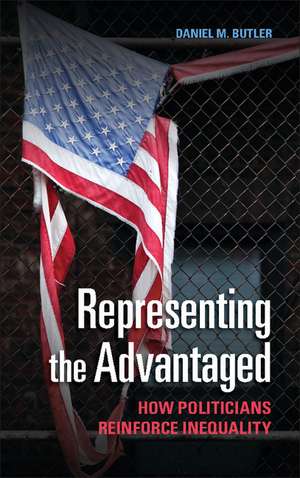Representing the Advantaged: How Politicians Reinforce Inequality
Autor Daniel M. Butleren Limba Engleză Paperback – 13 iul 2014
| Toate formatele și edițiile | Preț | Express |
|---|---|---|
| Paperback (1) | 174.55 lei 6-8 săpt. | |
| Cambridge University Press – 13 iul 2014 | 174.55 lei 6-8 săpt. | |
| Hardback (1) | 555.06 lei 6-8 săpt. | |
| Cambridge University Press – 13 iul 2014 | 555.06 lei 6-8 săpt. |
Preț: 174.55 lei
Nou
Puncte Express: 262
Preț estimativ în valută:
33.40€ • 34.51$ • 27.80£
33.40€ • 34.51$ • 27.80£
Carte tipărită la comandă
Livrare economică 26 martie-09 aprilie
Preluare comenzi: 021 569.72.76
Specificații
ISBN-13: 9781107428720
ISBN-10: 1107428726
Pagini: 162
Ilustrații: 6 b/w illus. 2 maps 20 tables
Dimensiuni: 152 x 226 x 13 mm
Greutate: 0.27 kg
Ediția:New.
Editura: Cambridge University Press
Colecția Cambridge University Press
Locul publicării:New York, United States
ISBN-10: 1107428726
Pagini: 162
Ilustrații: 6 b/w illus. 2 maps 20 tables
Dimensiuni: 152 x 226 x 13 mm
Greutate: 0.27 kg
Ediția:New.
Editura: Cambridge University Press
Colecția Cambridge University Press
Locul publicării:New York, United States
Cuprins
1. Representatives as the source of bias; 2. When can representation break down?; 3. Details of the constituency-service field experiments; 4. Bias in the way officials process constituents' opinions; 5. Information costs and officials' proactive effort levels; 6. Direct discrimination; 7. Bias in politics.
Recenzii
'A fascinating study of how America's politicians respond to their constituents. Butler's novel and compelling experiments show that elected officials often (but not always) discriminate against their own constituents who hold lower-status jobs, who identify with the opposite party, or who belong to a different racial or ethnic group. By systematically studying thousands of state and local officials, Butler brings solid new evidence to bear on questions at the heart of democratic governance.' Martin Gilens, Princeton University, New Jersey
'This path-breaking book is the first to use field experiments to investigate public officials' responsiveness to their constituents' requests and inquiries. Its thought-provoking conclusions about the role of race, class, and gender are sure to inspire debate and a new wave of representation research.' Donald P. Green, Columbia University
'Representing the Advantaged is a must-read for anyone interested in identifying the elite roots of income and racial inequality in contemporary American democracy. Butler persuasively argues that informational and attitudinal biases of elected officials affect the quality of political representation. Using field experiments, Butler shows that these biases impede responsiveness by legislators and other elected officials to disadvantaged constituents. This book changed the way I think about political representation.' Christian Grose, University of Southern California
'Representing the Advantaged is one of the most important books on representation that I have read in a long time. The methodological approach is innovative, the theoretical insights are illuminating, and the results - particularly regarding the unique disadvantages that racial and ethnic minorities face - are disconcerting. Butler does a tremendous job of highlighting a central weakness in our democracy.' Vincent Hutchings, University of Michigan
'This path-breaking book is the first to use field experiments to investigate public officials' responsiveness to their constituents' requests and inquiries. Its thought-provoking conclusions about the role of race, class, and gender are sure to inspire debate and a new wave of representation research.' Donald P. Green, Columbia University
'Representing the Advantaged is a must-read for anyone interested in identifying the elite roots of income and racial inequality in contemporary American democracy. Butler persuasively argues that informational and attitudinal biases of elected officials affect the quality of political representation. Using field experiments, Butler shows that these biases impede responsiveness by legislators and other elected officials to disadvantaged constituents. This book changed the way I think about political representation.' Christian Grose, University of Southern California
'Representing the Advantaged is one of the most important books on representation that I have read in a long time. The methodological approach is innovative, the theoretical insights are illuminating, and the results - particularly regarding the unique disadvantages that racial and ethnic minorities face - are disconcerting. Butler does a tremendous job of highlighting a central weakness in our democracy.' Vincent Hutchings, University of Michigan
Notă biografică
Descriere
This book argues that a significant amount of bias in representation traces its roots to the information, opinions, and attitudes that politicians bring to office.















